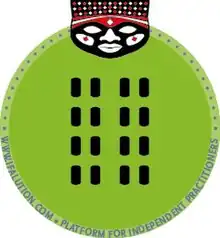Ọyẹku
Yoruba

Ọ̀yẹ̀kú
Etymology
Folk etymology suggests it comes from ọ̀- (“nominalizing prefix”) + yẹ̀ (“to avoid, to dodge”) + ikú (“death”), literally “That which avoids death”. It is a possibility that the root term may relate to kú (to die) as the second part of the term stays relatively consistently throughout Volta-Niger languages, and kwu or ku is generally associated with old roots for death, however, in some cognate terms, it changes, so that assertion is unlikely, but possible. See Gun Ìyẹ̀kú, Itsekiri Akú, Igala Ọyẹkwu, Igala Akwu, Edo Àkó, Urhobo Àkó, Igbo Àhwụ, Nupe Eyako, Ebira Ọ̀hàkú. Proposed to be derived from Proto-Yoruboid *V-kwú
Pronunciation
- IPA(key): /ɔ̀.jɛ̀.kú/
Proper noun
Ọ̀yẹ̀kú
- The second principal sign of the Ifa divination system
- The second of the àpólà or sixteen categories in the Odù Ifá, consisting of the second principal chapter, (Ọ̀yẹ̀kú méjì) and the other fifteen chapters of Ọ̀yẹ̀kú (beginning with Ọ̀yẹ̀kúlógbè).
- Synonym: àpólà Ọ̀yẹ̀kú
- The second chapter of the Odù Ifá corpus, and one of the major ojú odù
- Synonym: Ọ̀yẹ̀kú Méjì
- The spirit and divinity associated with the Ọ̀yẹ̀kú divination sign
- Synonym: Ọ̀yẹ̀kú Méjì
This article is issued from Wiktionary. The text is licensed under Creative Commons - Attribution - Sharealike. Additional terms may apply for the media files.